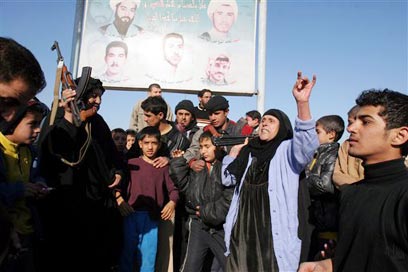
Iraqis joyous after Saddam execution
Photo: AP
The execution of former Iraqi president Saddam Hussein sent many Palestinians into deep mourning Saturday as they struggled to come to terms with the demise of perhaps their most steadfast ally.
Unlike much of the rest of the world, where Saddam was viewed as a brutal dictator who oppressed his people and started regional wars, in the West Bank and Gaza he was seen as a generous benefactor unafraid to fight for the Palestinian cause - even to the end.
Purportedly, Saddam's final words were, "Palestine is Arab."
"We heard of his martyrdom, and I swear to God we were deeply shaken from within," said Khadejeh Ahmad from the Qadora refugee camp in the West Bank. "Nobody was as supportive or stood with the Palestinians as he did."
During the first Gulf War in 1991, the Palestinians cheered Saddam's missile attacks on Israel, chanting "Beloved Saddam, strike Tel Aviv," as the Scud missiles flew overhead.
Funding the cause
Saddam further endeared himself to the Palestinians during the recent intifada with Israel by giving USD 25,000 to the family of each suicide bomber and USD 10,000 for each Palestinian killed in fighting. The stipends amounted to an estimated USD 35 million.His support for the Palestinians was at least partially aimed at gaining widespread support throughout the Arab world.
Saddam's downfall was seen as a great tragedy by Palestinians, who lionized Saddam and praised his willingness to stand up to America and Israel.
"Saddam was a person who had the ability to say, 'No' in the face of a great country," said Hosni al Ejel, 46, from the al Amari refugee camp near Ramallah.
"He wanted the Palestinian people to have a state and a government and to be united. But God supports us, and we pray to God to punish those who did this," said Ghanem Mezel, 72, from the town of Saeer in the southern West Bank.
Others were happy to hear of Saddam's alleged final words, believing that his support for them remained unshakable until the end.
Palestinians in the West Bank town of Bethlehem opened a "House of condolences" where people can gather to mourn Saddam. The organizers hung Iraqi flags, pictures of Saddam and broadcast Iraqi revolutionary songs.
Mohammed Barghouti, the minister of labor in the Hamas-led Palestinian Cabinet, said that although his Islamic group was often at odds with the secular Saddam, his execution was wrong. "The Palestinians had bonded with Iraqis in brotherhood," he said.
In Israel, where Saddam was seen as an enemy, there was little sadness. But Deputy Defense Minister Ephraim Sneh expressed concerns about Iraq's path in the post-Saddam era.
According to Sneh, Israel was concerned about the strengthening of Iranian influence in the Shiite sections of southern Iraq and in the central government.
Iraq had also become a regional "power station" for terror that could spread chaos throughout the Middle East, he said. "We have to be worried about what is going to happen now," he said.















